7 Ways To Improve SEO with Question Keywords

Hand off the toughest tasks in SEO, PPC, and content without compromising quality
Explore ServicesHow people search on Google is changing.
Searches are becoming more complicated, more specific, and longer.
When people turn to Google for help with something, their search is often written in the form of a question.
They might ask when a new album is being released, the name of an actor they saw in a movie or how to use a tool or product.
Whatever the search query, these are examples of the rise of question keywords.
People are always going to ask Google questions. And these keywords will only become more common as voice search becomes more popular.
Ready to help your clients find and target question keywords?
Let’s go.
Question Keywords & Semantic Search
So, what are question keywords?
Well it’s pretty obvious, but in case you need a definition:
Question keywords are used when a person types a complete and specific question into Google.
For example, instead of using a general keyword like “Diabetes”, a question keyword would be “how do I know if I have diabetes?”.
You might be wondering why question keywords are important?
Ever since their Hummingbird update, Google wants to show more relevant and helpful results to their users. This personalized approach uses what Google calls “semantic search”.
WTF is semantic search?
Semantic search refers to how Google is able to predict what information you are looking for. It uses four main principles:
- The user’s search history
- Natural language processing (NLP)
- Query stream context
- Entity identification
Here’s an example of this in action.
Let’s stick with the example of diabetes.
Say you are looking for information about diabetes, so you go to Google and type “what is diabetes?”.
You read a little about it, and decide you want more specific information about its symptoms or causes. So you start typing a search for that, and in the suggested searches you see this:
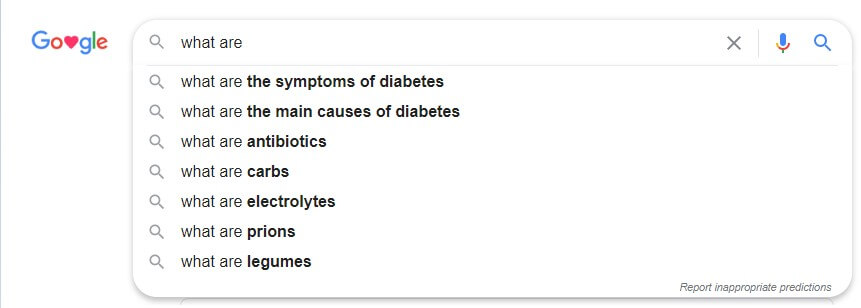
Google is able to predict your search question because of:
- Your recent search history on the topic of diabetes
- The natural language used in questions to guess the rest of what you’ll ask
- The typical series of questions people ask about diabetes
- An understanding of what diabetes as an entity is
Predicting what you want to search for is only part of it.
Google also uses semantic search to predict what results would be most useful to you. It is what results they show that makes it so important to optimize your SEO for question keywords.
Uncover new keywords 🔑
Give us some topics/seed keywords and we’ll research these queries, along with related terms, search intent and topic grouping. Then we’ll compile into an actionable keyword report.
So what Is the benefit of this for SEO?
When people ask specific questions, they are highly motivated.
They have a specific need in that moment and they are going through Google to find a website or someone who can fulfill it. Or at least answer it.
Their need might be information, but it can also have a commercial intent behind it.
For example:
If someone is looking for information about diabetes, their next step might be to look for tests or treatments. If your client’s business is based on helping people with diabetes, it is your job to get that client’s website at the top of those searches.
Optimizing a website for question keywords has many benefits, including:
- Increasing click-through rate (CTR) from organic searches (hello more traffic).
- Establish your client as an authoritative source among more users
- Drive more conversions from potential customers who are actively shopping around
One of the best ways to get your client to the top of searches with relevant question keywords is with featured snippets. A featured snippet is when someone asks a question, and Google shows one specific answer at the top of the results.
If you ever used Google, I’d be surprised if you’ve never seen one before – they are everywhere, across all types of searches.
Featured snippets are shown over all the organic results, and lets you show more than just the link to your page.
It shows the user a short answer to their question. That gives you the best opportunity to earn the user’s click if they want more information.
There are different kinds of featured snippets you can try to get, but there are three that are shown the most:
- Paragraph
- Lists (numbered or bulleted)
- Table
Let’s take a quick look at some examples:
Paragraph snippet:
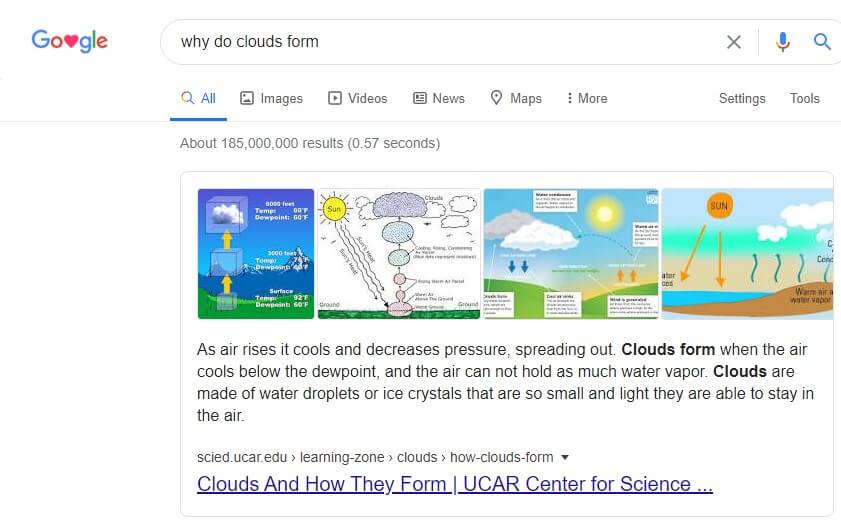
Lists snippet:
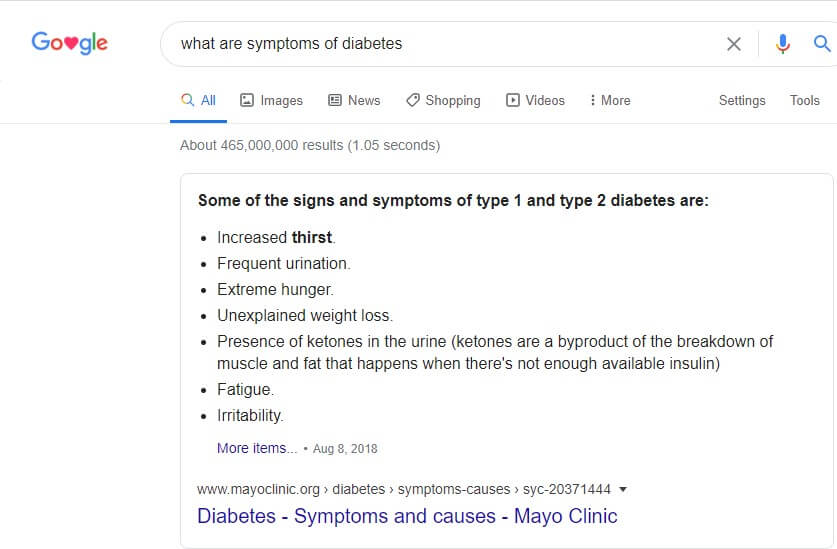
Table snippet:
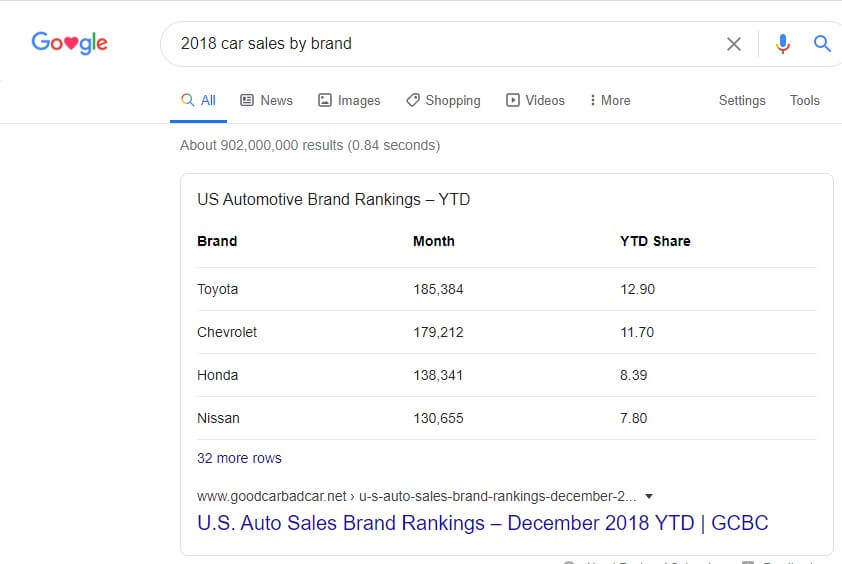
If you’re sold on the importance of optimizing your client’s websites for question keywords, it’s time to take the first step:
7 Ways to Find Question Keywords
The first question you might have is how to find question keywords for your clients?
Thankfully, there are many SEO tools and processes that will help you find highly relevant question keywords.
Once you have a good list, you can start updating the content on your client’s website to earn featured snippets from Google.
Let’s jump in and find some questions:
1) AnswerThePublic + QuestionDB
AnswerThePublic and QuestionDB are two similar tools you can use to find tons of question keywords. With both, you enter a general keyword or topic and it returns up to hundreds of question keywords based on that topic.
Here’s an example to show you how the process can work.
Let’s say you have a client who is a skincare clinic and product retailer.
Enter a general topic such as “dry skin” into either of these tools, and the tool will put it into “who”, “what”, “where”, “why”, “when” and “how” questions.
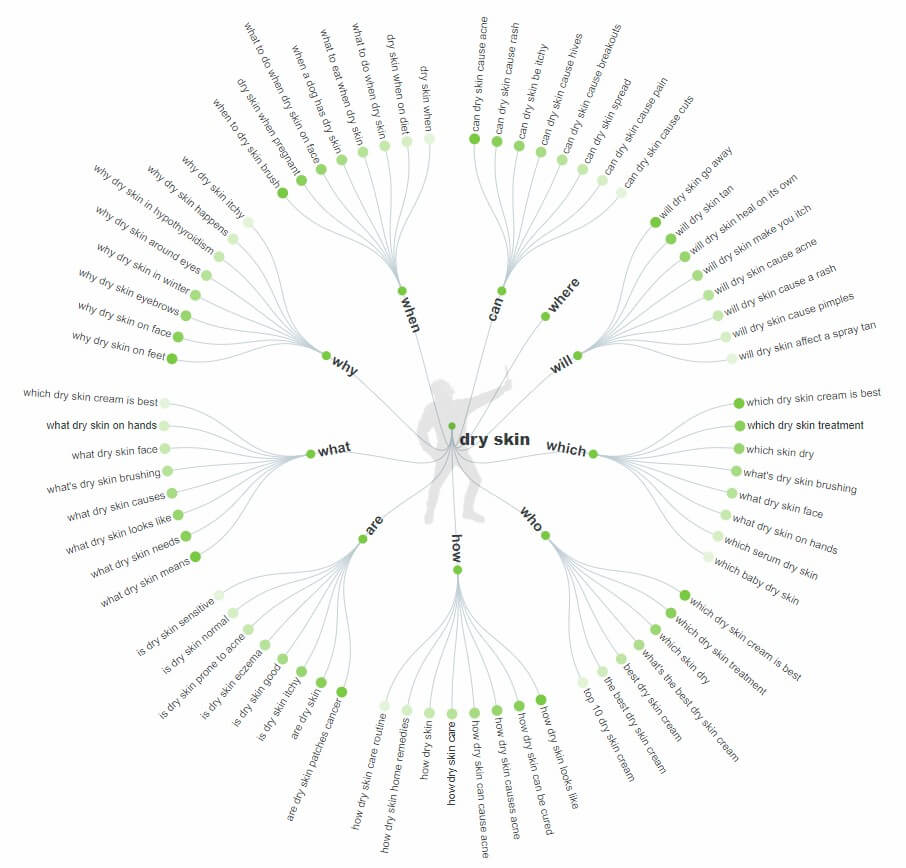
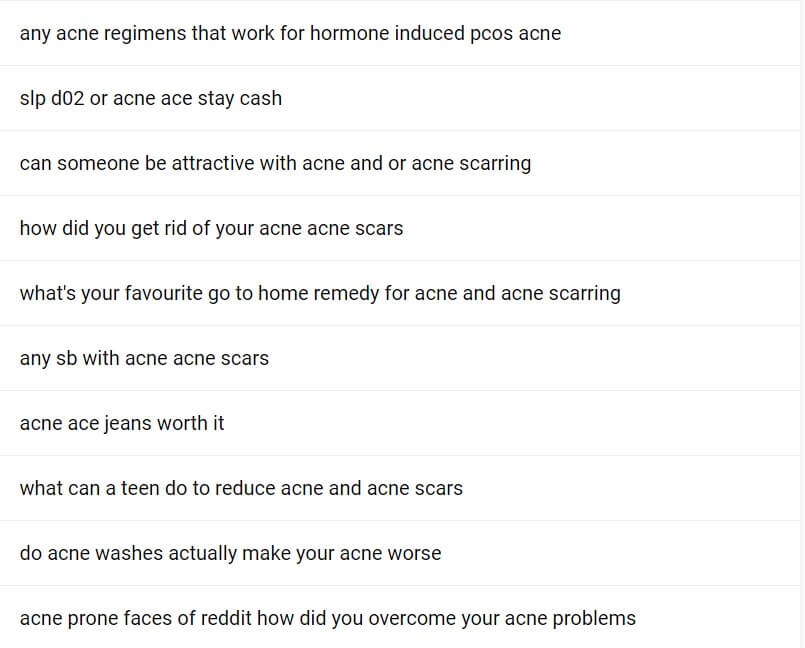
You can see questions like:
- “what dry skin needs”
- “how dry skin can be cured”,
- “which dry skin cream is best”.
These are perfect opportunities to write content to answer those questions. If you get featured snippets for them, your client will get more organic traffic and potential customers.
Once you mine a list for as many useful questions as you can find, move on to the next general keyword.
Try as many different topics or keywords as possible that are relevant to your client.
2) Ahrefs keyword explorer
Ahrefs’ Keyword Explorer is one of the best tools you will find for keyword research.
At its most basic level, it can work just like the two tools mentioned above. But it also lets you dig much deeper.
Here’s how you can use it to better understand how you can best answer a specific question keyword.
First, follow the same steps as above. Enter your general keyword into the explorer. You will see results like this:
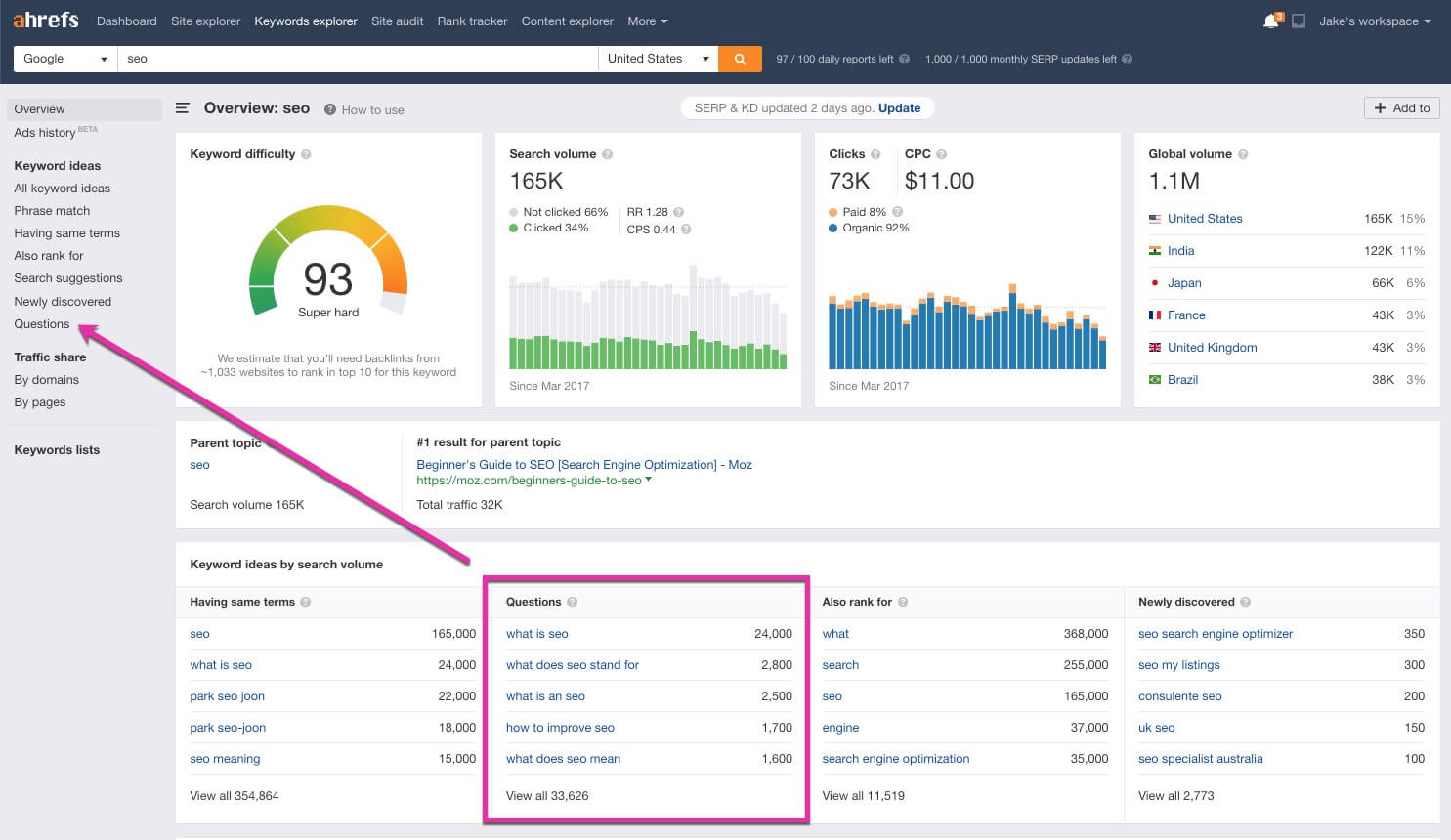
From there, click to view the “Questions”. It will show you the full list of what questions use your main keyword, and what the average search volume is.
Now for the next step, click on a specific question keyword, or enter the whole question in a new Explorer search.
It will show all keywords that funnel into that question search. Use this list to see what other questions are asked, and what non-question keywords are included.
You can get a better idea of what people tend to know vs what they ask about. This helps you understand what you need to answer, what information keywords to include in your content, and so on.
3) SEMrush keyword magic tool
SEMRush’s Keyword Magic Tool lets you more easily sort question keywords into groups.
It makes it much easier to find the questions that are more relevant to your client. It also helps you find question keywords that have better intent towards a transaction.
For example, let’s say your client runs a roofing business.
So you go to the Keyword Magic Tool and enter a general keyword: roofing. From there you can click on the “questions” button to see all question keywords, with the average volume and other useful data.
You will see a lot of questions related to DIY topics, such as how to install roofing yourself.
Still useful, but maybe you want to focus on more valuable questions.
So, you will see along the column to the left of the results specific categories. When you click on one of them, like “cost”, it will filter the results so you see all question keywords related to roofing AND cost.
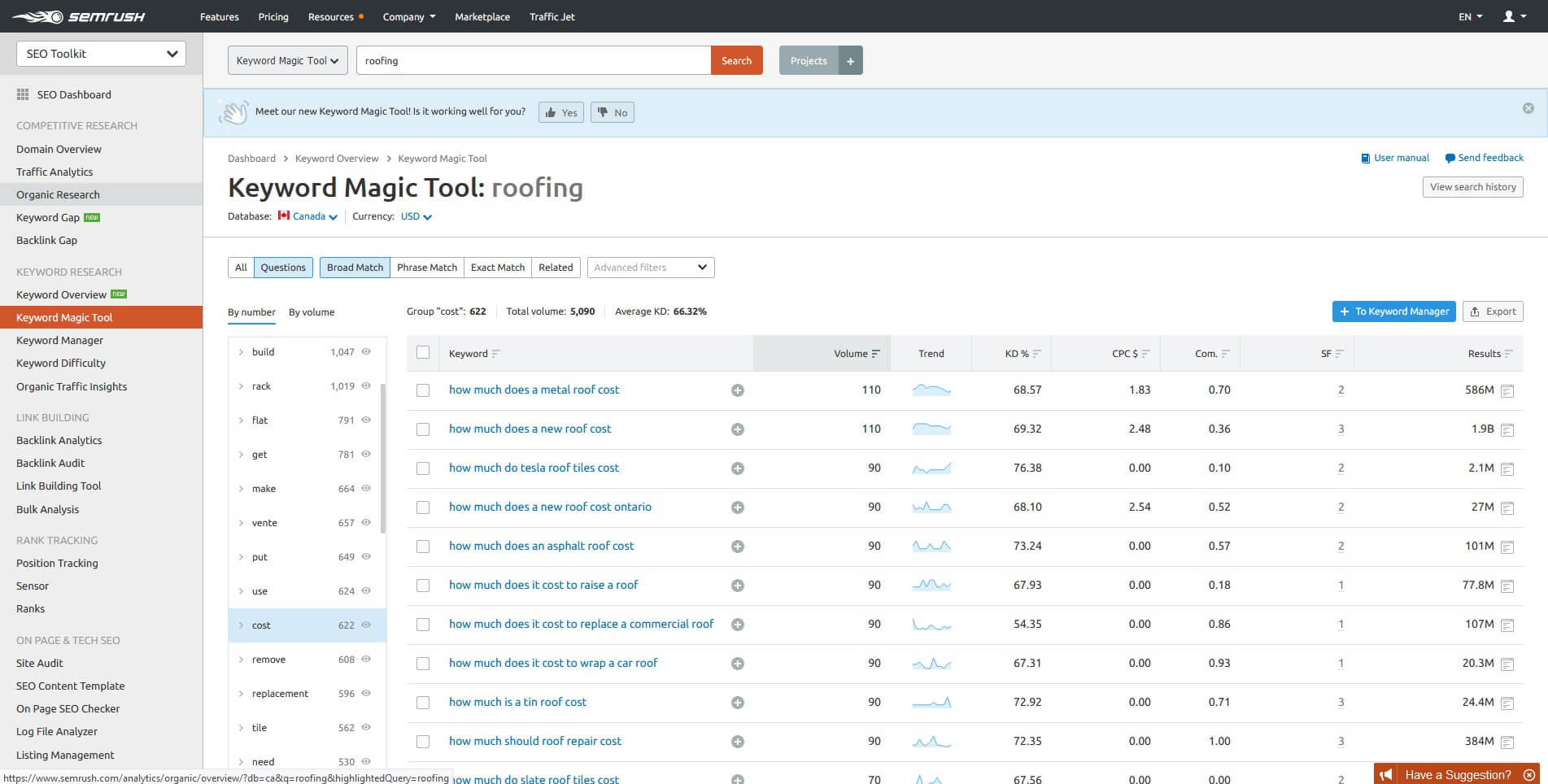
People asking about cost are more likely to be active shoppers for roofing services.
So you can make sure you have content to answer the specific questions in that category. Search down the category column to find all the most valuable questions and start focusing on that content.
4) Use existing site data (GA + GSC)
What better source of question keywords than your own website? There are two ways you can do this.
First, you can use Google Analytics’ Search Term report if your client’s website has a “search” function included on their site.
Login to your Analytics account and select the client website.
From the sidebar on the left, click Behavior > Site Search > Search Terms to access this report. It will look something like this:
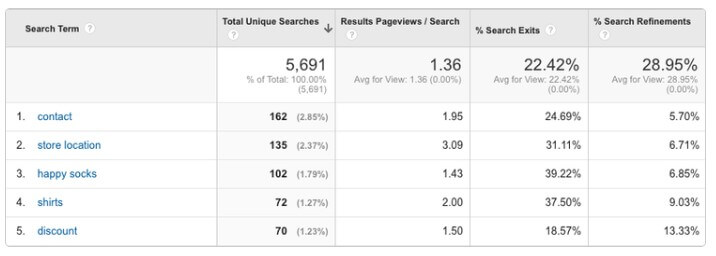 Screenshot taken from: https://www.lovesdata.com/blog/site-search-reports
Screenshot taken from: https://www.lovesdata.com/blog/site-search-reports
These are the search terms that people used on the client’s own website. You can use them to get a good idea of what their own customers are asking.
Chances are, if they’re looking for something like “store location” it’s because their website doesn’t have that information.
Use this report to find what content their website is missing, hidden, or doesn’t answer the questions well enough. Optimize their website by filling in the gaps so you aren’t wasting opportunities to earn easy conversions.
The second tool is Google Search Console’s Performance Report.
From the sidebar on the left, click on Performance. By default it will show you the keywords that led to people clicking on your website in the results in the last 3 months.
You can play around with the filters for the length of time, location, device, and so on.
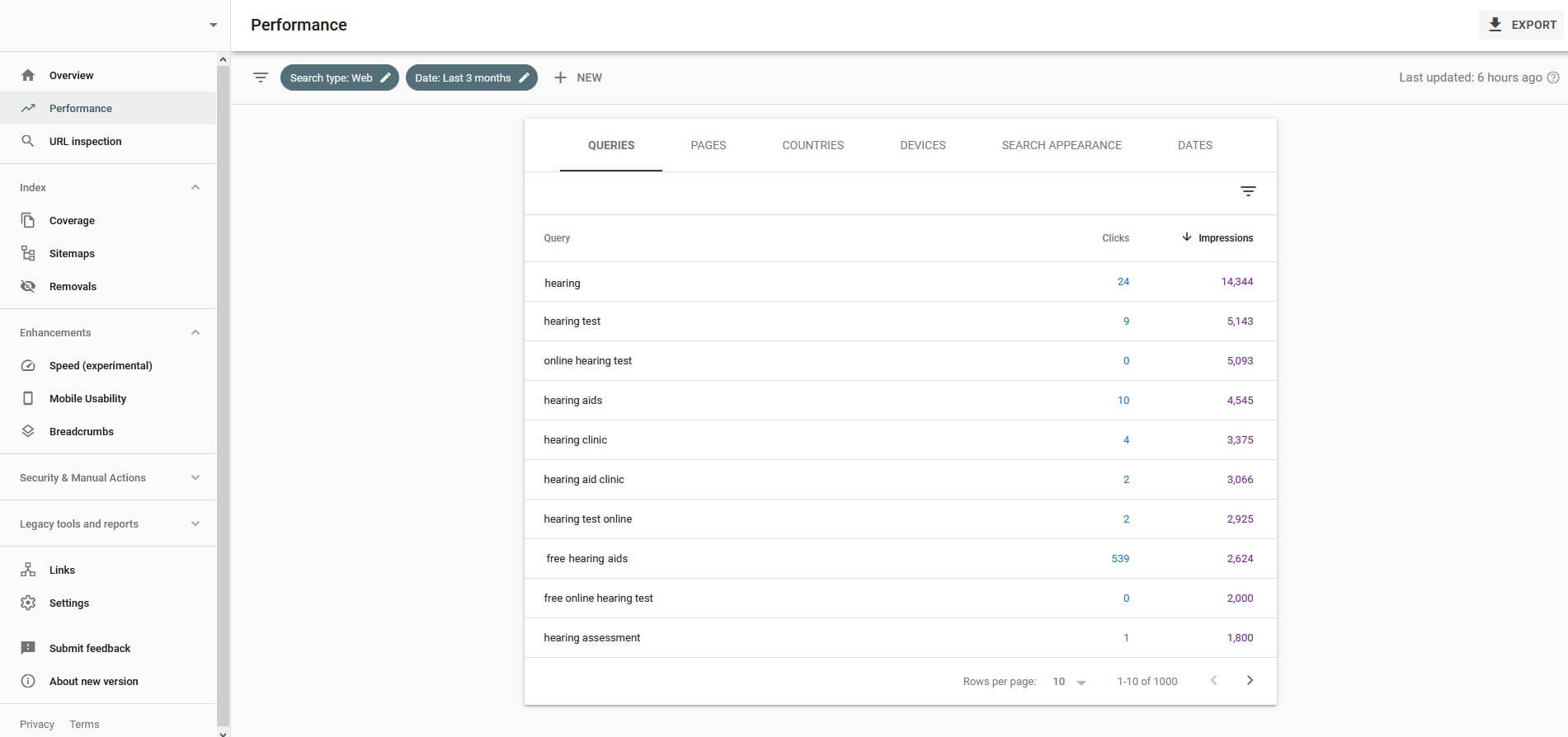
Export the results into a spreadsheet, and start filtering them for question words like who, what, where, why, when, how, can, is, etc. If you’ve used other tools on this list you will have a good idea of what question words are most often included.
Take a look at what question keywords have a lower than average click rate. Those represent opportunities to make sure your client has content to answer those queries.
5) Steal your competitors keywords
There are numerous SEO tools that can find what keywords a competitor website ranks for: Ahrefs, Moz, SEMRush, and Majestic SEO are four of the best tools, but there are many more.
Here’s how to use them to perform a keyword gap analysis between your client and their competitors.
First, make a list of your client’s competitors.
You can ask them directly since they will know the big ones. You can also check the local search results in their area to see who ranks at the top of the results already.
Next, add the competitor’s website into your tool of choice. It will show a list of what keywords they rank for as well as other relevant search data. Some will allow you to compare the rankings with your client’s website as well.
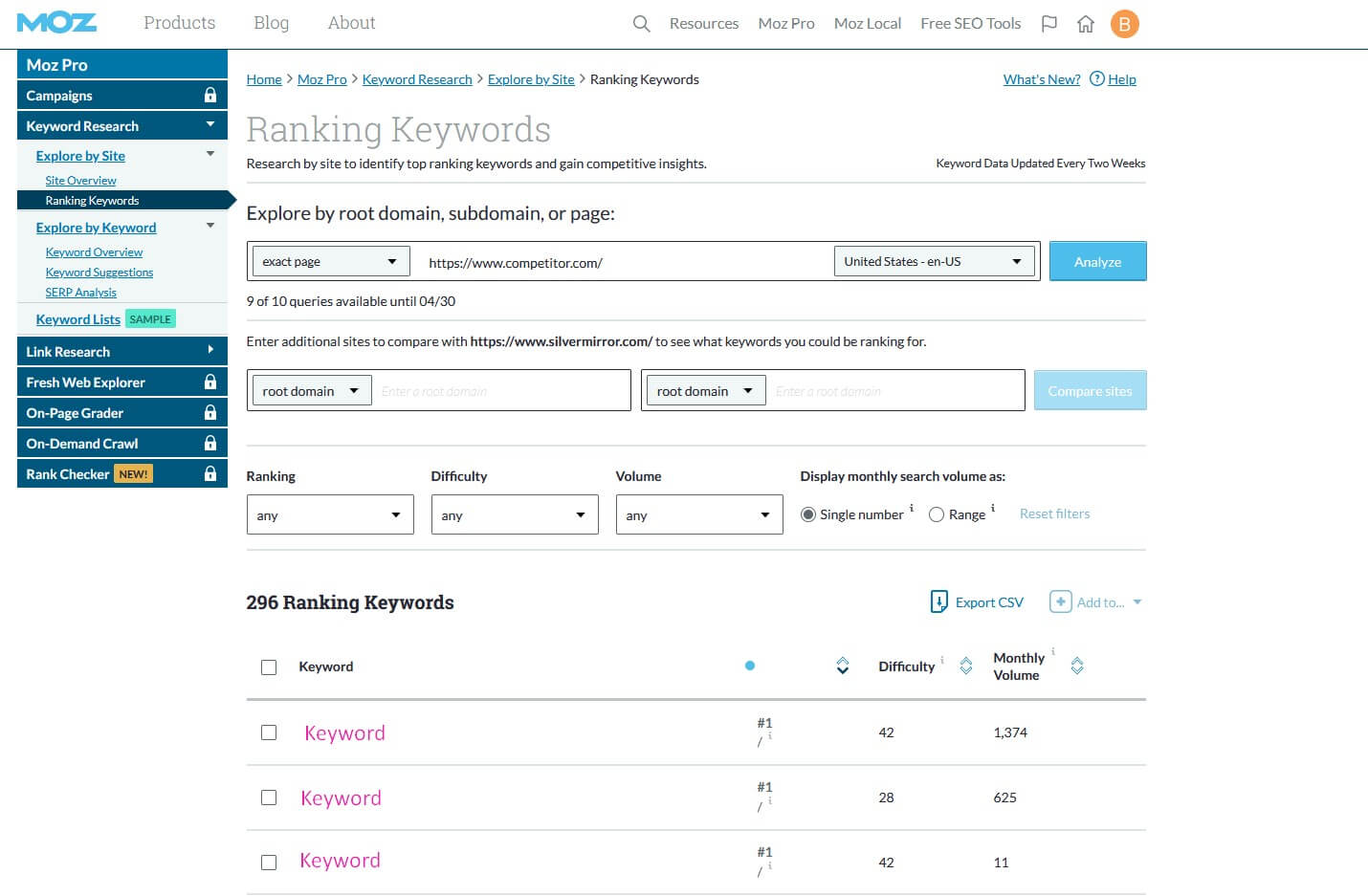
Now make a list of all the question keywords they rank well for that your client doesn’t. You can then see what content they have to answer those questions.
Use them to get an idea for what you have to do to one-up their content to steal their rankings and featured snippets.
6) Generate your own list with Google Sheets
If your niche or industry has lots of topics that you can write about, then you can create a spreadsheet that generates new question keyword ideas for you.
You can make your own list of question keywords, or have your client make one.
It’s a good idea to work with your client on this. They’re the ones who deal with customers to know what questions that real customers will ask. Their insights will be very useful to this exercise.
Once you have some topics, use Google Sheets to put the list together. Start with a seed keyword related to one of the main products or services your client provides and then apply modifiers to generate ideas.
For example:
Let’s say you run a dog training school.
You could create a list of dog breeds and generate a list of keyword ideas based on modifiers like:
- facts
- colors
- guide
- temperament
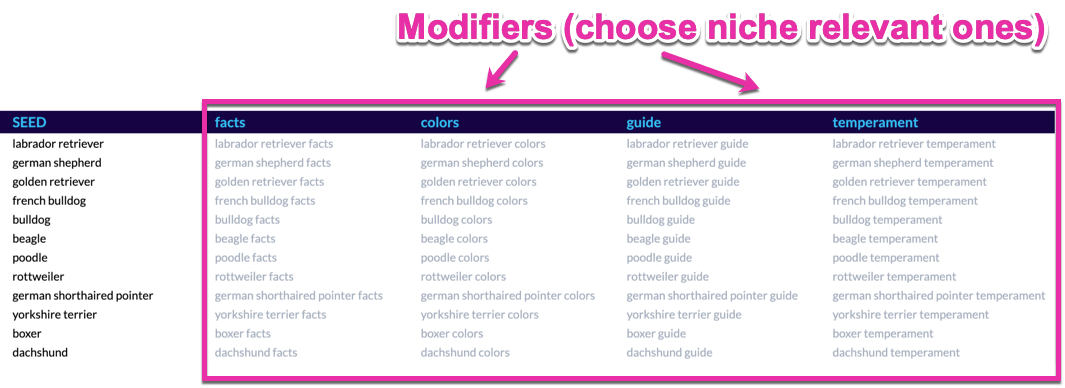
Have a play around the modifiers. You’ll want to change these up depending on the niche.
Dog owners will be looking for keywords around ‘temperament’ but it’s unlikely someone looking for driveway power washing will be.
You can make a copy of the simple keyword generator here.
Once you’ve generated these ideas, you can grab search volumes for them and prioritize.
If you have a bunch of keywords like this that follow the same (or similar) formats, you can turn these into FAQ content.
7) Reddit, Quora, communities & forums
The last source of question keywords you will find are on websites like Reddit, Quora, and niche-specific online communities.
Anywhere that has user-generated content, where someone can join to ask a question to the community to get help.
For Reddit, you can use Higher Visibility’s Reddit Keyword Research Tool.
- Start typing in a general keyword to pick the right “subreddit”.
- Click “get Keywords” and you will see the highest searched keywords in that subreddit.
- You can click on “Context” to see real search results to see what questions people ask on the topic.
Here’s an example:
Search the /r/skincareaddiction subreddit and you will see Cod Liver Oil has the highest average search volume. When you click on the Context button, you will see results like these:
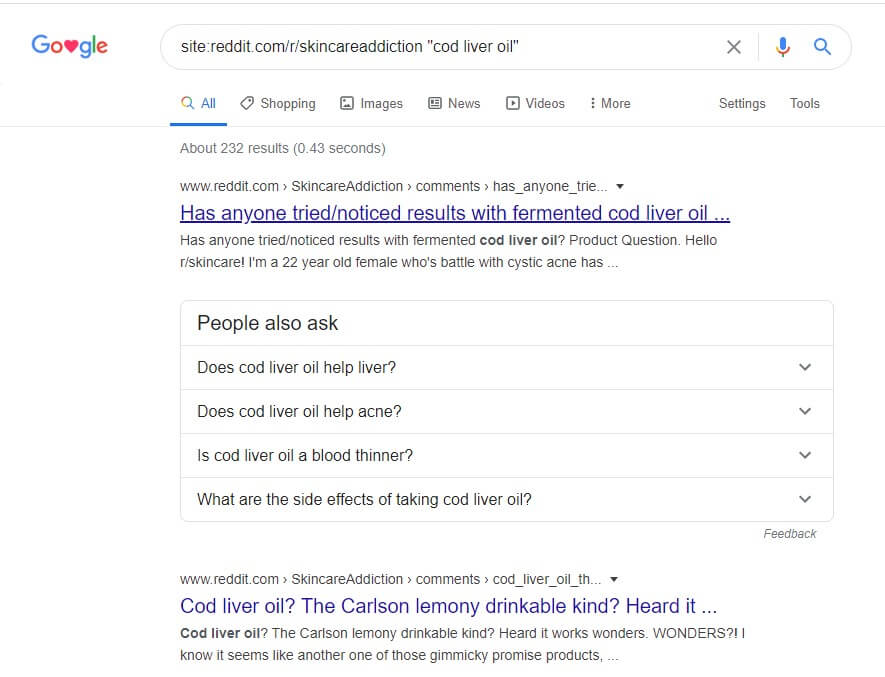
This will give you an idea that skincare enthusiasts are very curious about cod liver oil. You can use it as an opportunity to write great informational content about the pros and cons of skincare products that use it.
You can follow a similar process on Quora or various internet forums and communities.
Look at the most asked questions to see what real people are most curious about.
See the answers that have the most upvotes to find out what information the people asking the questions found the most useful.
Summary
With these tools and simple processes, you will be able to start improving your client’s SEO using question keywords.
The next step will be to write great content built around answering the questions better than competitors. That way, if you do it right, your client will reap the rewards of question keywords, semantic searches, and featured snippets.
They will get more traffic, a higher click rate from search results, and more conversions from customers looking to buy.
Hand off the toughest tasks in SEO, PPC, and content without compromising quality
Explore ServicesWritten by Aaron Haynes on May 12, 2020
CEO and partner at Loganix, I believe in taking what you do best and sharing it with the world in the most transparent and powerful way possible. If I am not running the business, I am neck deep in client SEO.





